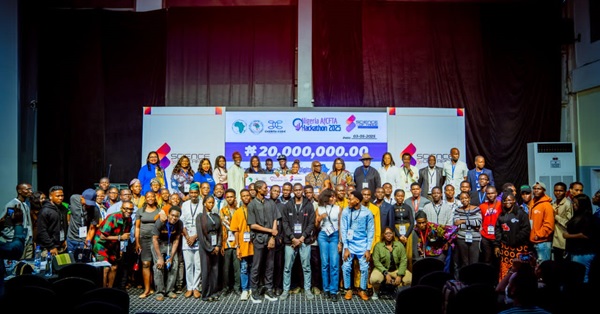
The director-general of the National Information Technology Development Agency (NITDA), Mallam Kashifu Abdullahi, has underscored the transformative power of emerging technologies in reshaping trade and investment across Africa.
Speaking through the agency’s director of the Digital Economy Development Department, Engr. Salisu Kaka, Abdullahi delivered a keynote address at the Nigeria AfCFTA Hackathon 2025, held as part of the Science of Trade Conference in Lagos. He emphasised that digital innovation holds the key to building efficient, inclusive, and sustainable economies across the continent.
He noted that the African Continental Free Trade Area (AfCFTA) represents one of the largest free trade zones globally, uniting over 1.4 billion people with a combined Gross Domestic Product (GDP) exceeding $3 trillion. “With the recent adoption of the AfCFTA Digital Trade Protocol, we now have a pivotal tool to eliminate longstanding trade barriers, harmonise digital policies, and create access to new markets for businesses of all sizes,” he stated.
According to him, Nigeria’s population of over 200 million, coupled with a thriving entrepreneurial culture and growing tech ecosystem, places the country in a prime position to lead Africa’s digital trade transformation. “Nigeria can and should be a digital powerhouse,” he asserted.
Abdullahi highlighted the dramatic growth of e-commerce and mobile payment systems as key enablers of seamless trade, citing his own experience: “From Abuja, I can order goods, carry out due diligence, make payments, and receive deliveries. Technology has erased distance and borders in trade.”
He described the timing of the Hackathon as strategic, coming on the heels of the African Union’s 2024 endorsement of the Digital Trade Protocol, which is designed to align digital regulations across all 54 African countries and foster a borderless digital economy.
However, the NITDA DG noted that while global advances in technology have transformed trade, African systems continue to struggle with outdated processes, excessive documentation, and logistical inefficiencies. “This is where innovation becomes critical. Emerging technologies such as blockchain, artificial intelligence, Internet of Things and digital platforms must now be at the core of Africa’s trade infrastructure,” he said.
To illustrate the power of digital tools, he referenced the Nigeria Customs Service (NCS), which increased its revenue by 238 per cent between 2017 and 2023 through the automation of declarations, tracking, and risk assessments via the Nigeria Integrated Customs Information System (NICIS II). The newly launched Unified Customs Management System (UCMS), introduced in December 2024 to replace NICIS II, has already generated over ₦31 billion in revenue – testament to the benefits of embracing digital trade facilitation.
The Nigeria AfCFTA Hackathon 2025 focuses on five priority areas: youth and MSME inclusion, e-commerce adoption, e-commerce policy and trust, digital payments and the e-commerce regulatory sandbox. These sectors, Abdullahi said, are ripe for disruption by digital innovation.
“I’m confident this Hackathon will ignite scalable solutions to boost intra-African trade, enable cross-border e-commerce, and equip MSMEs with the digital tools to thrive globally,” he added.
He described the event as a platform for fostering groundbreaking ideas that simplify payments, deepen digital inclusion, and solidify Nigeria’s role in shaping the future of the AfCFTA digital economy.
In his welcome address, Dr. Olusegun Awolowo, the national coordinator of the Nigeria AfCFTA Coordination Office – represented by Olusegun Olutayo, a senior international trade policy and law expert – described Africa’s economic transformation as a shared journey. He stressed that innovation, collaboration, and inclusive growth are critical to establishing the continent as a global leader in digital trade.
Awolowo reiterated that AfCFTA presents Africa with a unique opportunity to become a single, unified market of over one billion people, driving unprecedented growth in intra-African trade and investment. However, he said achieving this potential depends on collective action.
“The Hackathon is more than a competition – it is a tangible mechanism for advancing the AfCFTA Digital Trade Protocol. It prioritises practical solutions that bridge policy and innovation, enabling African entrepreneurs to lead the digital future,” he concluded.


